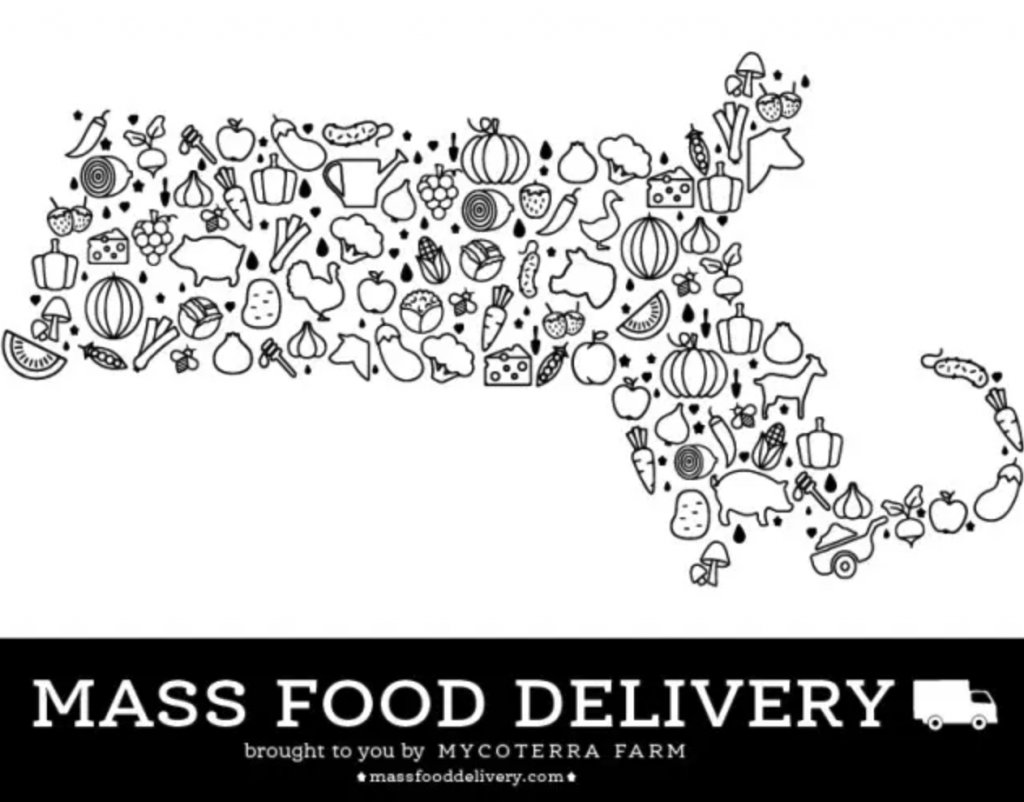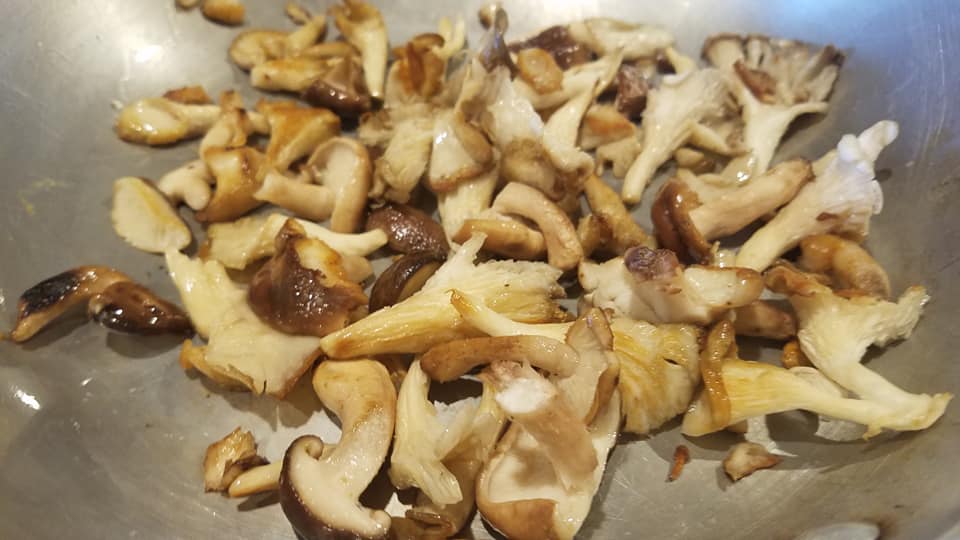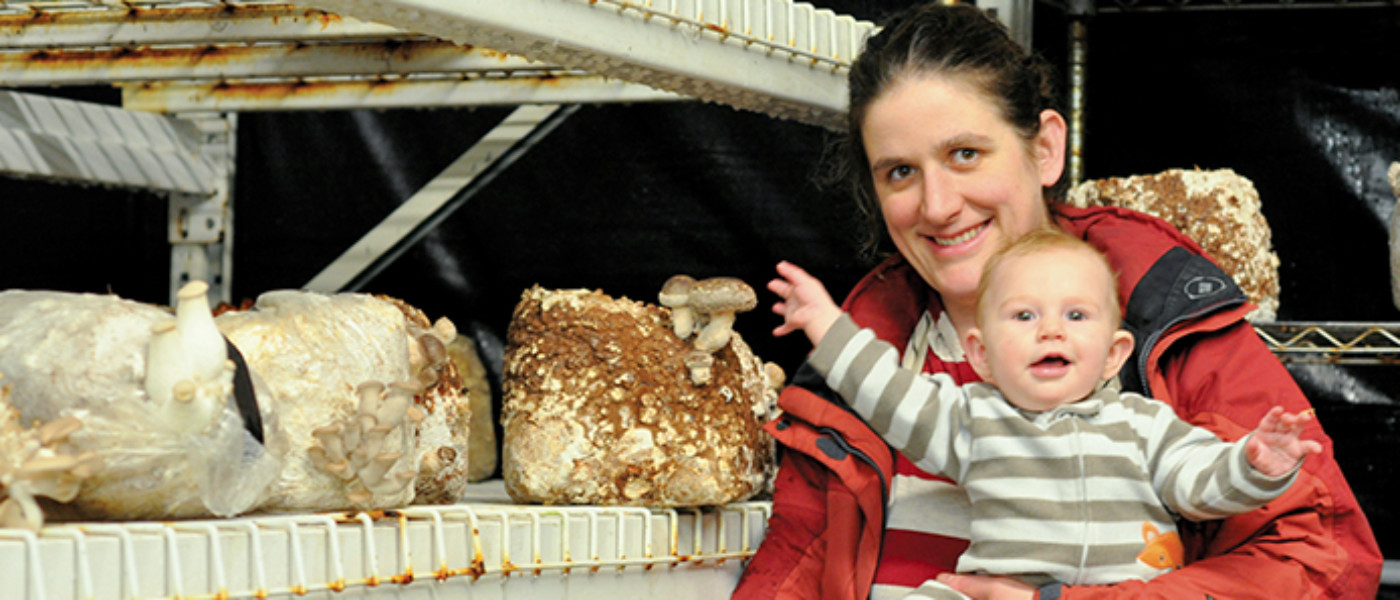Julia Coffey is the owner and operator of MycoTerra Farm in South Deerfield, Massachusetts. MycoTerra Farm produces organic, gourmet mushrooms indoors, year-round. The mushrooms, of all kinds of species, are grown using a sterile laboratory procedure to inoculate and produce mushrooms on sawdust substrate supplemented with organic grains.
When COVID-19 struck, Julia knew that her work would grow beyond mushrooms. She leapt into action to create Mass Food Delivery, a food hub that now works with 28 New England farms and local food businesses, delivering throughout most of Massachusetts. Customers place their order online by Saturday and receive contact-less delivery between Tuesday and Saturday. The food goes from the producer, to the delivery hub, and straight to your door!
The below Q&A is extrapolated from a podcast produced by CISA (short for Community Involved in Sustaining Agriculture, a long-time Farm Aid grantee and partner working in Central Massachusetts) and an extra question via email. You can listen to the full podcast here.

Farm Aid: What were the impacts of COVID-19 on your farm/farm community that pushed you to act?
Julia Coffey: About a month ago, as our farmers markets, and college campuses that we serve, and our restaurants were closing, I basically panicked a little bit. Those sales channels amount for about 80% of our income. And we saw them blowing up right before our eyes. It was a very knee jerk response. I talked with some of my team members here, about perhaps instead of going to farmers markets, we could offer a home delivery service. That was the beginning of Mass Food Delivery. I responded to a group email announcing that the Northampton Market was closing, and I stated my plans and other vendors from that farmers market replied that were interested in supplying food and collaborating with us, delivering produce across Massachusetts.
Farm Aid: What did you do – what were your first steps? How long did it take to get your new effort/model up and running?
Julia Coffey: Back in the beginning of March we were already beginning to implement sterile lab procedures on the farm. I rounded up my crew and we spread out in a large radius in the driveway. I explained the situation with the colleges and restaurants and farmers markets that we rely on closing. But that I was committed to staying in business and keeping everyone employed. It was a challenging dialogue with all of us wearing face masks, and at quite a distance, on a blustery, windy day.
Within 2-3 days, we build a website and we sent it to CISA for thoughts and ideas and that got rapidly shared. Our site crashed within two hours of going live from the traffic and we have continued to refine on the technical side and update server capacity. But, yeah, Mass Food Delivery was born!
Farm Aid: What were the biggest challenges you had to figure out?
Julia Coffey: It’s been a big pivot for us. A major motivating factor for me is the bigger picture of agriculture in Massachusetts. MycoTerra Farm produces indoors year-round. We go through the same growing process, week after week, all year round. However, for other farms, it is such a critical and urgent time of year. For them to have disruptions in their income stream during planning and planting and transplanting time of the year could be a major upset to the local food system.
Food Access is one of the reasons I became a farmer; it’s a cause we’re very committed to. I don’t want to exclude people who need food the most. We were set up with the mobile market app to accept SNAP and HIP (shorthand for Healthy Incentives Program, a state-based program that doubles SNAP dollars when they’re spent at local farmers markets and farm stands). We’re using our remote terminals to process SNAP payments at the time of delivery. However, sometimes we’ll have a box out for delivery and we can’t reach the person to do the payment process. Rather than wait for payment, we’re letting some go. Because It’s important for us first and foremost to make sure people can get the food. Also, our $10 delivery fee is waived for those purchasing with SNAP benefits.

Mycoterra Farm mushrooms
Farm Aid: What has been the reaction to your new farm business innovation?
Julia Coffey: Mass Food Delivery quickly grew from 80 customers to more than 800! We have 28 local farms and food businesses. Products available include local vegetables and fruits (apples currently); bread, tortillas and locally grown and milled flour; honey, cheese, eggs, milk cream, tofu, maple syrup, jams, mushrooms, pasta, salsa, herbal tinctures. And Mass Food Delivery is hiring new employees from people who formerly worked in restaurants but are now out of work.
Farm Aid: As a farmer, what is one thing you want eaters to know right now? Or what is one thing you’ve learned about farming/food/your community or your self during this time?
Julia Coffey: COVID- 19 has exposed many flaws in our food systems; however, this is our chance to get it right. It is time to reorganize and localize our food economy. Supporting local farms is more important now than ever, but it’s more than just shopping at the farmers market. We need to support the organizations that support farmers, like CISA – Community Involved in Sustaining Agriculture. CISA has been instrumental to our pivot to mass food delivery, from getting the word out, technical advice, funding and connecting us to resources and partner farms. Like everything meaningful, it takes a village.





